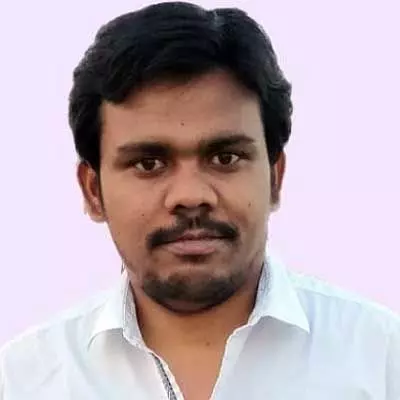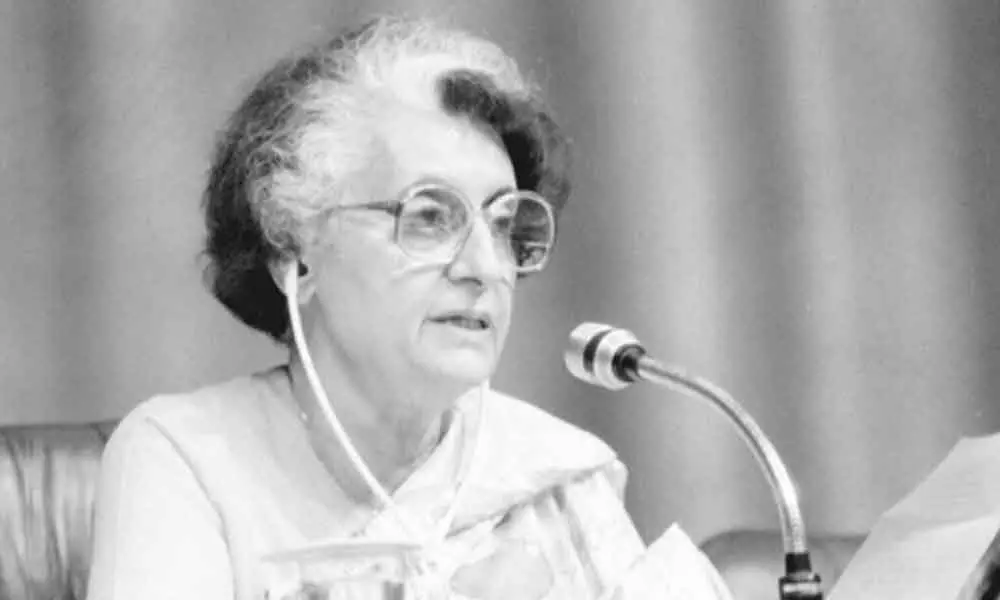Live
- Centre keen to promote traditional crop varieties for climate-resilient agriculture
- Activist Harassed and Attacked While Documenting Elephant’s Ordeal at Tamil Nadu Temple
- BJP Accuses Congress of Incorrect India Map on Posters, Slams 'Mohabbat ki Dukaan' for Appeasing China
- DIGIDHAN Mission driving India’s leadership role in digital payments: Finance Ministry
- KLH Bachupally Campus Students Showcase Outstanding Athletic Talent and Achievements
- ITC HOTELS’ OPEN WELCOM HOTEL JABALPUR IN MADHYA PRADESH
- Hyundai IONIQ 5 takes part in GUINNESS WORLD RECORDS™ title for the Greatest altitude change by an electric car
- Xiaomi Pad 7 India Launch on January 10: Expected Price, Specifications, Features, and More
- Muzigal launches its State-of-the-art Music Academy in Miyapur, Hyderabad.
- AP Weather Alert: Meteorological Department Issues Rain Warning for Next 2 Days
Just In
Emergency in India: The Dark Phase in India That Proved Indira Gandhi's Dictatorship!


Indira Gandhi (File Photo)
Emergency in India: The emergency is a dark chapter in the Indian democratic country. The late Prime Minister Indira Gandhi, known as the 'Iron Lady' took a drastic decision in her political life.
The emergency is a dark chapter in the Indian democratic country. The late Prime Minister Indira Gandhi, known as the 'Iron Lady' took a drastic decision in her political life. It is a bitter memory that haunts the Congress party even to this day. It is now 46 years since the imposition of that 'emergency' that deprived the people of their freedom and rights. The decisions taken by Indira Gandhi in order to retain her power made the life of the people horrible. From June 25, 1975 to March 21, 1977 all the people were shaken by the dictatorship and the dark period continued for 21 months. Millions were imprisoned and experienced torture in the jails.
Let us have a look at the consequences that led to the imposition of emergency during the reign of Indira Gandhi.
The Congress party won 352 seats in the 1971 general election and bagged the secularist status by nationalising the banks. Indira Gandhi has become the Prime Minister and the government was once again formed with a huge majority. She played a major role in the formation of Bangladesh (war with Pakistan) and emerged as an unprecedented leader. She was hailed as an ephemeral incarnation by those who criticized her. It was during this time that the image of Indira as a goongy gudia (dumb doll) was removed and she became the most powerful woman as Goddess Durgamatha, the Iron Lady.
But four years later the story changed completely with increase in drought and unemployment in the country, industrial development is lame that ignited flames of discontent among people from all walks of life. In the wake of these developments, it seems that the state of emergency has actually been imposed since midnight on June 25. The Allahabad High Court's verdict that Indira Gandhi's election as an MP was invalid in addition to the conditions in the country had played a key role in the imposition of the Emergency.
In the 1971 elections, Indira Gandhi contested from Rae Bareilly and the United Socialist Party fielded Raj Narayan as its candidate. He, however, approached the Allahabad High Court alleging that Indira had used her position during the election and committed irregularities to win elections. The order was passed by High Court Judge Justice Jagmohan Lal Sinha on June 12, 1975. Indira Gandhi was accused of abusing power by obstructing the government machinery during the elections. In this context, the election of Indira Gandhi was cancelled. She was ruled out of the election for another six years. This created conditions for Indira to step down as Prime Minister.
In this context, Indira Gandhi arranged an emergency meeting at the then Prime Minister's official residence at 1 Safdarjang Road. She asked her loyal leaders and close associates to give her instructions. Then Indira's son Sanjay Gandhi told her to move the Supreme Court challenging the High Court verdict and the Supreme Court ruled that Indira could continue as Prime Minister following the rules. However, it clarified that her election as an MP was invalid until the final verdict. This has led to anti-Indira protests across the country.
In the wake of these developments, Indira Gandhi asked then President Fakhruddin Ali Mohammed to sign the Emergency Declaration in view of the internal turmoil. With his approval, a decision was taken to impose a state of emergency on June 25 under Article 352 (1) of the Constitution of India. Opposition leaders Jayaprakash Narayan, Atal Bihari Vajpayee, LK Advani and Morarji Desai were arrested in this connection. In addition, various leaders and senior journalists across the country including 11 lakh people were jailed.
In the same way, freedom of expression was curtailed and all factions oppressed. Magazines and media were censored; human rights violations have taken place on a large scale. This order was met with fierce opposition from the people towards Indira Gandhi government. Speaking on the radio to the people of the country, she defended herself for imposing the emergency in the wake of conspiracies against the government. Extending the emergency four times at the rate of six months, she finally lifted it on March 21, 1977.

© 2024 Hyderabad Media House Limited/The Hans India. All rights reserved. Powered by hocalwire.com






